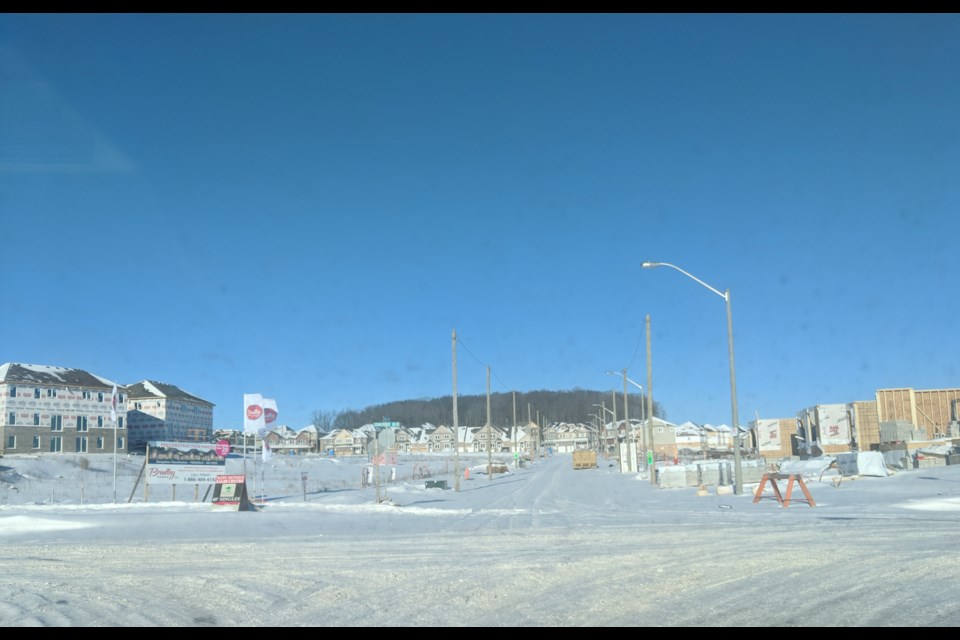Prolonged, record-breaking growth has proven to be a mixed blessing for Orillia.
While the sustained construction activity is positive economic news, it’s also stretched municipal resources beyond its limits, leading to lengthy backlogs for those seeking building permits.
Because of that, city council approved the hiring of a new building inspector during its budget deliberations last week.
“It will definitely help,” said Kelly Smith, the city’s chief building official.
She said the city set a record, in 2008, when 589 building permits were issued.
After that, things went “back to normal” until 2016. That year, the city issued a record-shattering 620 permits that included 160 single-family homes.
In 2017, the number of permits ballooned to 657; 212 of those related to single-family homes.
Last year, the trend continued as the city issued 696 permits; 253 were for single-family homes.
“It’s been three-years of record-breaking numbers of building permits,” said Smith. “We are seeing dramatic growth.”
That dramatic growth has stressed staffing. In addition to Smith, there are just three building inspectors employed by the city.
That means during the busy, peak periods spanning spring and summer, there can be a four- to five-week delay for a building permit.
“In the last two years, during busier times, we’ve had up to a five-week backup,” said Smith.
During those times, inspectors worked extra hours, a summer student was added and staff tried to streamline the process as best they could, but there was too much work for too few hands.
“There was definitely frustration,” said Smith, noting a homeowner who simply wanted to build a deck could not understand why they had to wait five weeks during a short summer construction season.
“We often hear; ‘It’s a small job. Why is it taking so long?’” Smith lamented.
But there was not much they can do. Nobody received preferential treatment. “When someone came to our counter, (the request) got date stamped and was put into the que," she said.
“It’s also been hard on our staff. They pride themselves on service,” said Smith. “It was hard for them to tell someone who comes to the counter that it’s going to take four weeks … it’s very frustrating.”
While a new inspector will help address that issue and take some of the stress off the other three inspectors, he/she will also inherit another key role.
Last year, the city decided to target the proliferation of illegal dwelling units in the city.
City council agreed to amend its zoning bylaw to exempt property owners on the east side of Highway 11 who might have an illegal unit, providing them an opportunity to obtain the necessary building permits to bring their rental units into compliance with building and fire code regulations.
Typically, this would impact houses that, over the years, have been transformed from single-family dwellings to multiple dwelling units without building permits or fire inspections.
According to Smith, city staff are aware of more than 300 illegal dwelling units; she knows there are many more.
Ideally, city staff or fire department officials should investigate every one of those apartments.
“The bottom line is safety,” said Smith, noting often it’s students who are living in basement apartments. “We have a lot of students come here to go to Georgian or Lakehead and they end up in these places. They don’t know what to look for. We’re just trying to make sure the housing stock out there is safe.”
For example, she likened pannelled rooms to “death traps” and said many of these units don’t have proper fire safety separation or safe exits.
“We are concerned that there over 300 properties that we know of. We’ve got to get out there,” she said, noting the “new position will help us start to work through this list.”
Safety and education is critical, said Smith, noting many property owners may not be aware the dwelling unit is illegal.
She said building department and fire department staff try to work with property owners and develop cost-friendly solutions.
For example, Smith developed a ‘made-on-Orillia’ solution that allows landlords to install a $50 residential sprinkler in a furnace room rather than forcing them to drywall the ceiling.
But Smith said it can be costly for a landlord to transform an illegal unit into a legal unit. While development charges are unlikely in most cases, most will have to pay a one-time $835 parkland fee for each unit.
They may also have to hire someone to create drawings and will have to obtain the building permit that should have been obtained when the work was originally done.
“We work with the property owners and most understand why it’s important,” said Smith. “It certainly adds up to a lot of hours for our staff.”
For more information on what is legal and what is not when it comes to dwelling units, read the city’s Guide to a House with Two Dwelling Units here.
All decisions made during budget deliberations, including the hiring of a new building inspector, must be ratified at tonight’s special meeting of council.
